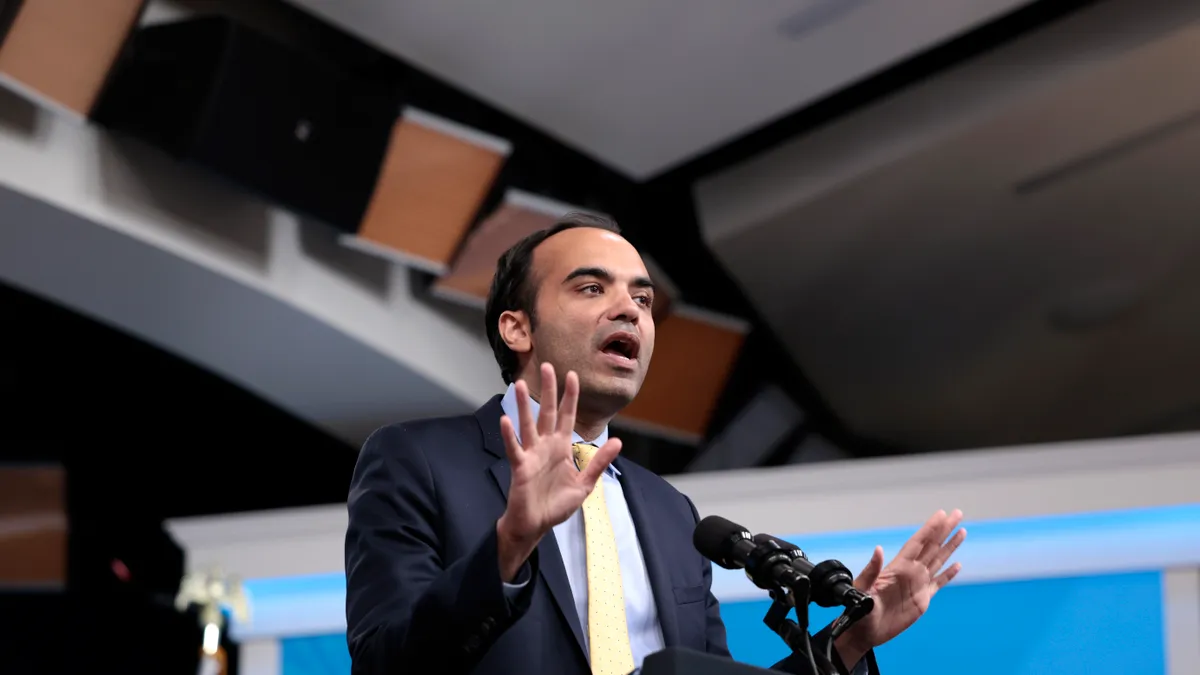Google, Apple and at least 15 other big tech providers of digital wallets and payments services would be covered by more federal regulation if a rule proposed Tuesday by the Consumer Financial Protection Bureau is finalized.
The federal agency has become increasingly concerned about non-bank companies providing digital payments services to consumers as the use of such tools, including peer-to-peer apps, have become more popular, according to a CFPB press release Tuesday.
The agency is seeking to subject the non-bank digital wallet providers to existing laws that banks must abide by in providing such services, and to thereby level the playing field among competitors. First and foremost, though, it’s aiming to protect consumers and their money from new risks.
"Today's rule would crack down on one avenue for regulatory arbitrage by ensuring large technology firms and other nonbank payments companies are subjected to appropriate oversight,” CFPB Director Rohit Chopra said in the release.
Consumers are not only using the digital payment tools to send money to friends and family, they’re also tapping them to pay bills and make in-store payments, the CFPB noted. At the same time, users are flagging more concerns about the services.
“Complaints about these applications and the companies that run them have been rising in recent years,” the agency said in the release.
The new oversight would apply to companies that handle five million or more digital payment transactions every year, the agency said. At the moment, the agency estimates that would cover about 17 companies, or 88% of U.S. non-bank digital consumer payments, according to details of the proposed new rule. Those businesses facilitated about 12.8 billion transactions in 2021 valued at about $1.7 trillion, the CFPB said.
“The CFPB is proposing to establish supervisory authority over nonbank covered persons who are larger participants in this market because this market has large and increasing significance to the everyday financial lives of consumers,” the agency said in a nearly 70-page description of the proposed rule.
Mountain View, California-based Google and Cupertino, California-based Apple would be among the companies expected to adhere to the new regulations, based on usage rates for their digital wallets, according to CFPB officials who requested anonymity when they spoke to reporters on Tuesday.
Digital payments pioneer PayPal would also likely be subject to the regulation, given its operation of the PayPal and Venmo digital wallet services. Overall, that San Jose, California-based company reported 22.3 billion transactions last year, according to its annual filing with the Securities and Exchange Commission. The digital payments tool Cash App, a unit of San Francisco-based Block, would also likely be covered, given its 51 million monthly users, according to its annual SEC filing.
Spokespeople for Google and PayPal declined to comment on the proposal while spokespeople for Apple and Block didn’t immediately respond to requests for comment.
A CFPB spokesperson declined to identify the companies that would be covered by the regulation or to comment on whether the rule would increase oversight for buy now, pay later providers that have also been the target of CFPB attention.
The agency said that it’s considering increasing or decreasing the annual transaction threshold that would specify which companies might be subject to the new oversight. Nonetheless, a threshold of one million or ten million in annual transactions wouldn’t significantly change the pack of payments players covered. In the former case, 19 companies would be covered and in the latter 14 companies, the proposal said.
The proposal follows the agency’s 2021 request for information from six big tech players, including Amazon, Apple, Facebook, Google, PayPal and Block’s Square, regarding their payments systems. The agency sought more input last year from the companies, and this year dug into “their use of sensitive personal data” and their “limiting competition and innovation in mobile payments,” the agency said in Tuesday’s release. Its actions this year led to scrutiny of Apple and Google tap-to-pay features in a report the CFPB issued in September.
The agency is seeking comments from the public on the proposal over the next two months.















